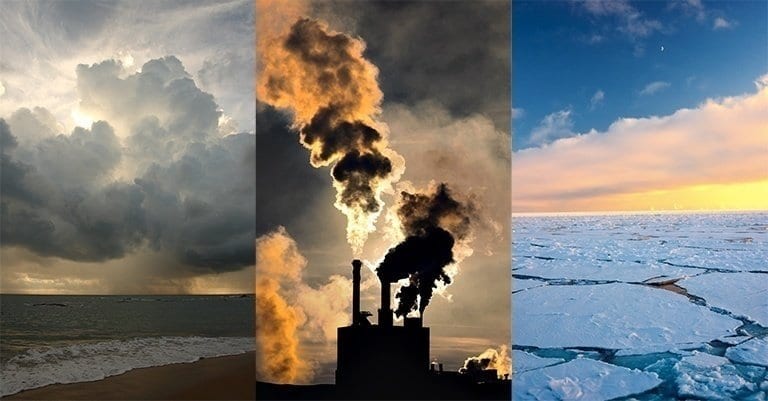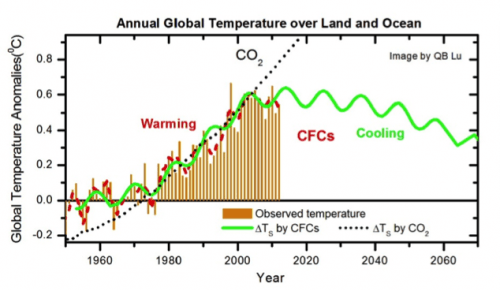
Israeli researcher claims his calculations show scientists have grossly underestimated the effects of air pollution.
The world’s scientific community has known for a long time that global warming is caused by manmade emissions in the form of greenhouse gases, while global cooling is caused by air pollution in the form of aerosols.
In a new study published in the journal Science, Hebrew University of Jerusalem Prof. Daniel Rosenfeld argues that the degree to which aerosol particles cool the earth has been grossly underestimated.
Aerosols are tiny particles of many different materials that get into the air, like dust and vehicle exhaust. They cool our environment by enhancing the cloud cover that reflects the sun’s heat back to space.
Rosenfeld says his findings necessitate a recalculation of climate-change models to more accurately predict the pace of global warming.
He and his colleague Yannian Zhu from the Meteorological Institute of Shaanxi Province in China developed a new method that uses satellite images to calculate the effect of vertical winds as well as aerosol cloud droplet numbers. Until now, it was impossible to separate the effects of rising winds, which create the clouds, from the effects of aerosols, which determine clouds’ composition.
Using this new methodology, Rosenfeld and his colleagues were able to more accurately calculate aerosols’ cooling effects on the Earth. They discovered this effect is nearly two times higher than previously thought.
Good news or bad news?
But this finding does not necessarily mean we can stop worrying about global warming. Rosenfeld has several theories about why temperatures are rising despite the aerosol effect.
“If the aerosols indeed cause a greater cooling effect than previously estimated, then the warming effect of the greenhouse gases has also been larger than we thought, enabling greenhouse-gas emissions to overcome the cooling effect of aerosols,” Rosenfeld said.
Another hypothesis to explain why Earth is getting warmer even though aerosols have been cooling it down at an even a greater rate is a possible warming effect of aerosols when they lodge in “deep clouds” located 10 kilometers or more above the Earth.
Israel’s Space Agency and France’s National Centre for Space Studies have teamed up to develop new satellites that will be able to investigate this deep-cloud phenomenon, with Rosenfeld as its principal investigator.
Either way, the conclusion is the same: Current global climate predictions do not correctly take into account the significant effects of aerosols on clouds on Earth’s overall energy balance, Rosenfeld says.
Currently, scientists predict a 1.5-degree to 4.5-degree Celsius temperature increase by the end of the 21st century. Rosenfeld’s findings may help provide a more accurate diagnosis and prognosis of the Earth’s climate.
Learn more: We need to rethink everything we know about global warming
The Latest on: The effects of air pollution on global warming
[google_news title=”” keyword=”the effects of air pollution on global warming” num_posts=”10″ blurb_length=”0″ show_thumb=”left”]
via Google News
The Latest on: The effects of air pollution on global warming
- Analysing labour on a warming planeton May 1, 2024 at 4:28 pm
ILO report highlights urgent need to climate-proof labor, address evolving risks, and overhaul OSH protections globally ...
- May Day 2024: Workers on a warming planet deserve stronger labour protectionson May 1, 2024 at 12:13 pm
Global climates are changing and the world is rapidly warming. Canada’s labour laws must keep pace with the rate of change to protect workers.
- European summers will be hotter than predicted because of cleaner airon May 1, 2024 at 11:00 am
By ignoring declining air pollution, regional climate models have greatly underestimated how hot Europe's summers and heatwaves will become ...
- 5 companies create a quarter of plastic pollution: Studyon April 29, 2024 at 3:07 pm
Welcome to The Hill’s Energy & Environment newsletter{beacon} Energy & Environment Energy & Environment The Big Story Five companies create a quarter of plastic ...
- The ’60s saw national teach-ins as a form of peaceful protest — it’s time to bring them backon April 29, 2024 at 6:00 am
On March 24, 1965, 200 faculty members at the University of Michigan in Ann Arbor suspended classes and held 12 hours of seminars, rallies and speeches against the Vietnam War. A similar event ...
- Warming climate threatens to worsen air quality in already polluted Kathmanduon April 29, 2024 at 5:14 am
Whenever 60-year old Saraswati Adhikari goes for a morning walk in Nepal’s capital, Kathmandu, she says she feels a certain unease in her chest. “I get a burning sensation in my eyes and nostrils and ...
- E.P.A. Severely Limits Pollution From Coal-Burning Power Plantson April 25, 2024 at 10:52 am
New regulations could spell the end for plants that burn coal, the fossil fuel that powered the country for more than a century.
- Coal and new gas power plants will have to meet climate pollution targetson April 25, 2024 at 2:10 am
Fifteen years after the EPA said greenhouse gasses are a danger to public health, the agency finalized rules to limit climate-warming pollution from existing coal and new gas power plants.
- Modeling broader effects of wildfires in Siberiaon April 24, 2024 at 6:00 am
As wildfires in Siberia become more common, global climate modeling estimates significant impacts on climate, air quality, health, and economies in East Asia and across the northern hemisphere.
- Earth Day 2024: What's the difference between global warming, climate change? What to knowon April 22, 2024 at 11:27 am
On Earth Day, learn about the difference between global warming and climate change, and find out what you can do to maintain planetary health.
via Bing News










